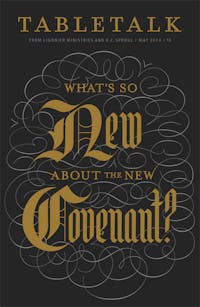
Request your free, three-month trial to Tabletalk magazine. You’ll receive the print issue monthly and gain immediate digital access to decades of archives. This trial is risk-free. No credit card required.
Try Tabletalk NowAlready receive Tabletalk magazine every month?
Verify your email address to gain unlimited access.
My theological journey to Reformed theology was not an easy one. For more than two years I fought against the doctrines of grace with all of the free will I could muster, until I came to my knees and admitted that God is God—that God is sovereign and I am not. Coming to grips with the sovereignty of God not only changed my understanding of salvation; it changed my understanding of everything. For two more years, armed with all my dispensational presuppositions, I continued to fight against confessional Reformed theology. I carefully examined Scripture, and with great scrutiny I studied our theological forefathers on every side of the debate about covenant theology. But it wasn’t until I came to grasp the newness and the nature of the new covenant and the relationship between the old and new covenants that I came to see God not only as sovereign over the salvation of His people, but also as covenantal in the way He relates to, sanctifies, and saves His people. In the end, I came to see that “Reformed theology,” as R.C. Sproul has said, is just a nickname for “covenant theology.”
The church has always confessed the newness of the new covenant, but Christian thinkers have differed on the nature of its newness. According to confessional Reformed theology, the new covenant is new in that the long-awaited seed of the woman promised by God at the inauguration of the covenant of grace (Gen. 3:15) has come and has fulfilled the old covenant of Moses, thus making it obsolete (Heb. 8:13). Whereas the first Adam failed to keep the covenant of works (Gen. 3:1–6), the second and last Adam, Jesus Christ, kept it perfectly (1 Cor. 15:45). Under the old covenant, the people of God saw only shadows, but now we see the One who cast the shadow: Jesus Christ, who is the end—the goal—of the law (Rom. 10:4). Under the old covenant, God’s people desperately awaited the coming One; now we delightfully celebrate the risen, ascended, and interceding One who perfectly fulfilled all the righteous demands of the law and is coming again. At His first coming Jesus Christ inaugurated the new covenant, and at His second coming He will consummate the new covenant. Only then will we enjoy the fullness of the new covenant and its privileges promised by God through His prophet Jeremiah (31:31–34).
The new covenant is new in that the long-awaited Messiah has come and has fulfilled the old, and the new covenant is superior in its scale, simplicity, and scope. Rather than narrowing the scope of the new covenant, covenant theology consistently portrays the broad and beautiful vista of the new covenant, leading us as God’s covenant people to worship our covenant-keeping God, coram Deo, before His face, both now and forever in Christ our covenant head.
